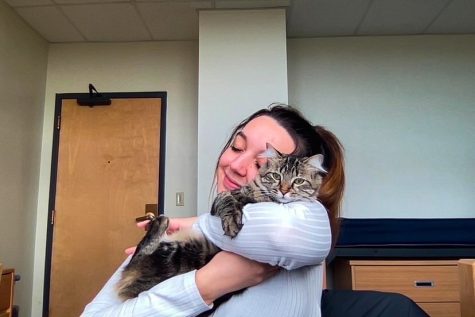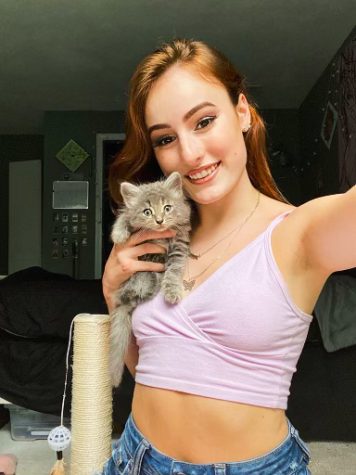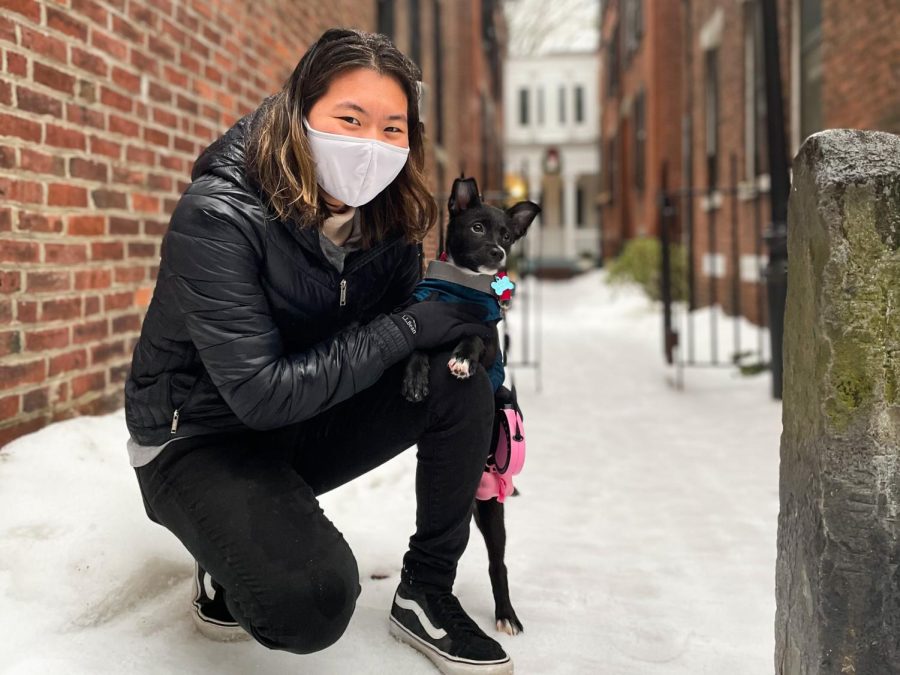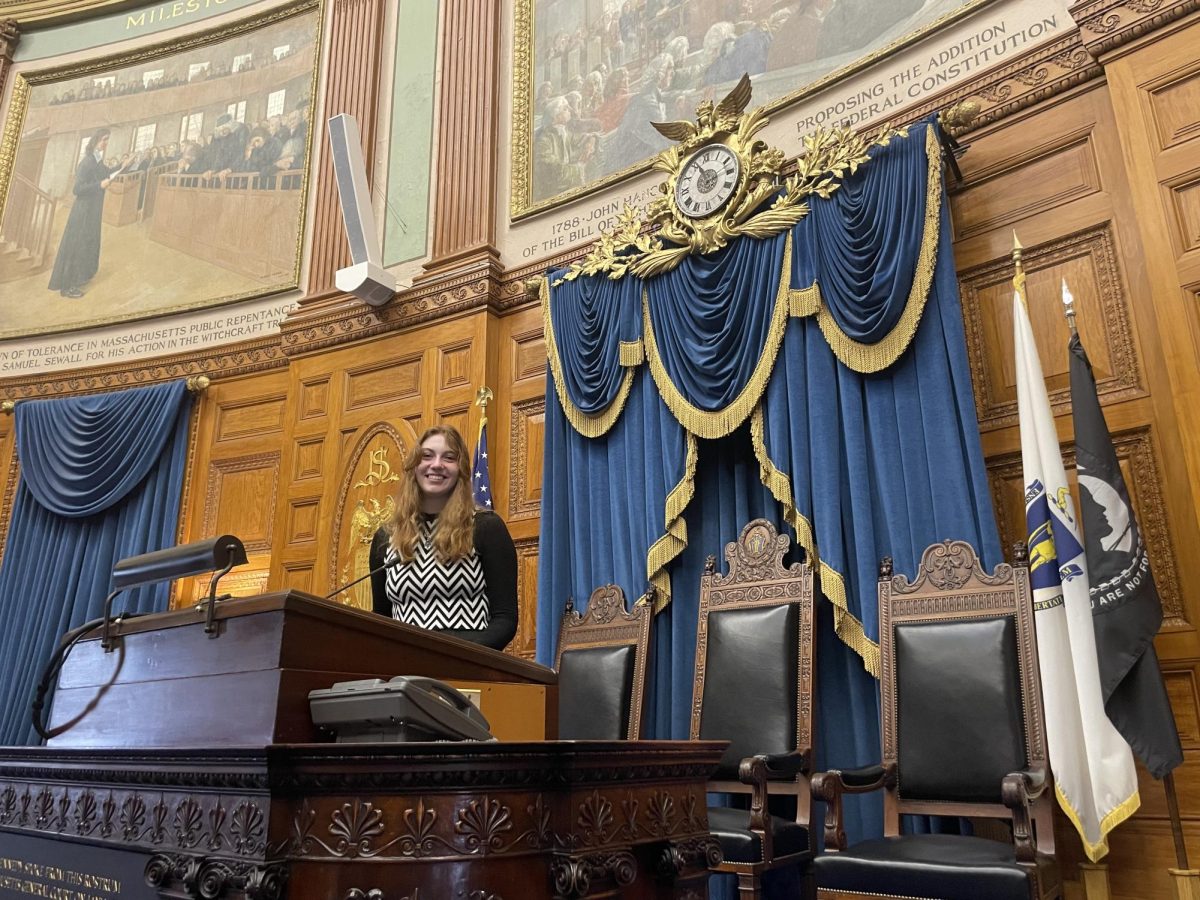With mental illness on the rise during the COVID-19 pandemic, emotional support animals have helped students by providing emotional support throughout the day, both across the country and at Suffolk.
Emily Boyle, a senior resident assistant at Suffolk, said this has been the case with her cat Pluto.
“One thing that I did not foresee Pluto helping me with emerged on my darkest days peak pandemic,” said Boyle. “Caring for Pluto forced me to care for myself. On those days when I did not have the strength to exist for myself, I would do it for him. In return, he gave me unconditional love.”
Before the pandemic, one in every 10 adults reported to have been suffering from mental illness. As of 2021, the number has risen to four in every 10 adults, according to the Kaiser Family Foundation.
WGBH News reported that in a study done of nearly 2,000 students, approximately 80% reported the pandemic to have negatively impacted their mental health in some way, something Andrew Cioffi, director of the office of disability services at Suffolk University, has also seen.
“The field of Disability Services in Higher Education is seeing a national trend of an increase in Emotional Support Animal requests since the start of the COVID pandemic,” said Cioffi.
According to Tufts, adopting an ESA has proven to be a highly effective way to decrease the effects of mental illness, specifically for college students. Some of the benefits include reducing feelings of stress, anxiety and many other negative emotions.
“I had rescued [my cat Iris] during a gap year and I decided when I applied to Suffolk that I would still need her. She brought me so much anxiety relief and she was so good for me,” said Ava Toscano, a Suffolk freshman studying political science.

Suffolk University defines an ESA as an animal that alleviates the symptoms of one’s disability. While service animals, which are trained to perform disability-related work are not required to register with Cioffi’s office, ESAs living on campus are, he said.
Boyle said certain responsibilities come with owning an ESA, a decision she said she did not take lightly.
“I waited until my junior year to take on an ESA because caring for a pet correctly is a huge responsibility. I feel like a lot of people rush into adopting ESAs, and in doing so underestimate all the time, money, dedication that goes into it,” said Boyle.
Students considering an ESA on campus must have a registered disability with the university, a letter from a healthcare professional and a signed contract outlining their responsibilities as an ESA owner in order to bring their pets on campus.
Students must also undergo a process to ensure they are in need of an ESA and that ensures they have talked to a healthcare professional. A veterinarian must verify that an ESA is in good health, according to Suffolk’s website.

“It’s honestly a pretty simple process. Suffolk is very forthcoming with their process about having ESAs on campus,” said Ally Forrester, a Suffolk sophomore double majoring in theater and psychology who lives with her cat Luna.
While owning an ESA supports students with disabilities, the responsibilities of being a pet owner can add a challenge to typical campus living. Febby Chang, a Suffolk junior studying biology with a minor in accounting, explained the difficulties she has faced while owning her dog Arya.
“It’s definitely challenging, financially and physically,” Chang said. “She’s a puppy. She wants to play, but she can’t leave this room unless we are exiting or entering the building.”
Chang said she has to take Arya out to the Boston Common frequently, and that she has enrolled her in a doggy daycare for when she has a busy class schedule due to the fact that students are not allowed to leave their animals unattended within the dorms.
“I hired a pet sitter… For the last week I would drop her off and then go to class and then come back and go get her,” Chang said. “But she has her rabies shot now so I can start dropping her off at the doggy daycare center at North Station… it’s a lot easier because North Station is closer to the campus buildings.”
Forrester said it can also be difficult taking care of an ESA when a student has a busy schedule.

“I’m a full-time student, I’m an honors student and I am very active in my clubs, so I’m pretty busy, which can be a little bit stressful when you have something that you’re caring for at home and you’re always out,” she said.
Toscano said students have to follow certain requirements with her ESA, like not being allowed take care of them when their owner cannot.
“You can’t leave for a night anywhere, you have to stay in the room and if I leave for a weekend she has to come with me. I can’t leave her with anyone,” said Toscano. “But it’s just a part of my routine now. I made my classes have gap periods in between so I could come check on her,” Toscano said.
“If she was bothering those around me, roaming the halls or I wasn’t taking care of her, Suffolk does reserve the right to terminate my contract,” Forrester added.
The conversation around mental health and ESAs has become more widespread due to COVID-19 and the extreme isolation many people have been experiencing during this time.
“I’m really happy we are talking about ESAs because they have incredible benefits to mental health especially during times like this with COVID where mental health concerns are on the rise,” Forrester said. “It’s really nice to know that you have options.”
Follow Bryce on Twitter @brycereagan1






















Rose Alvina • Aug 30, 2022 at 5:40 am
Thanks for sharing such an amazing and interesting article. As a therapist, I believe that having an animal is best for reducing anxiety and stress because it helps people to distract from their issues and through this, it will be helpful for them to overcome their issues. If someone wants to learn more about animal emotional support then see this.
https://igotucorp.com/2022/08/25/california-esa-letter/